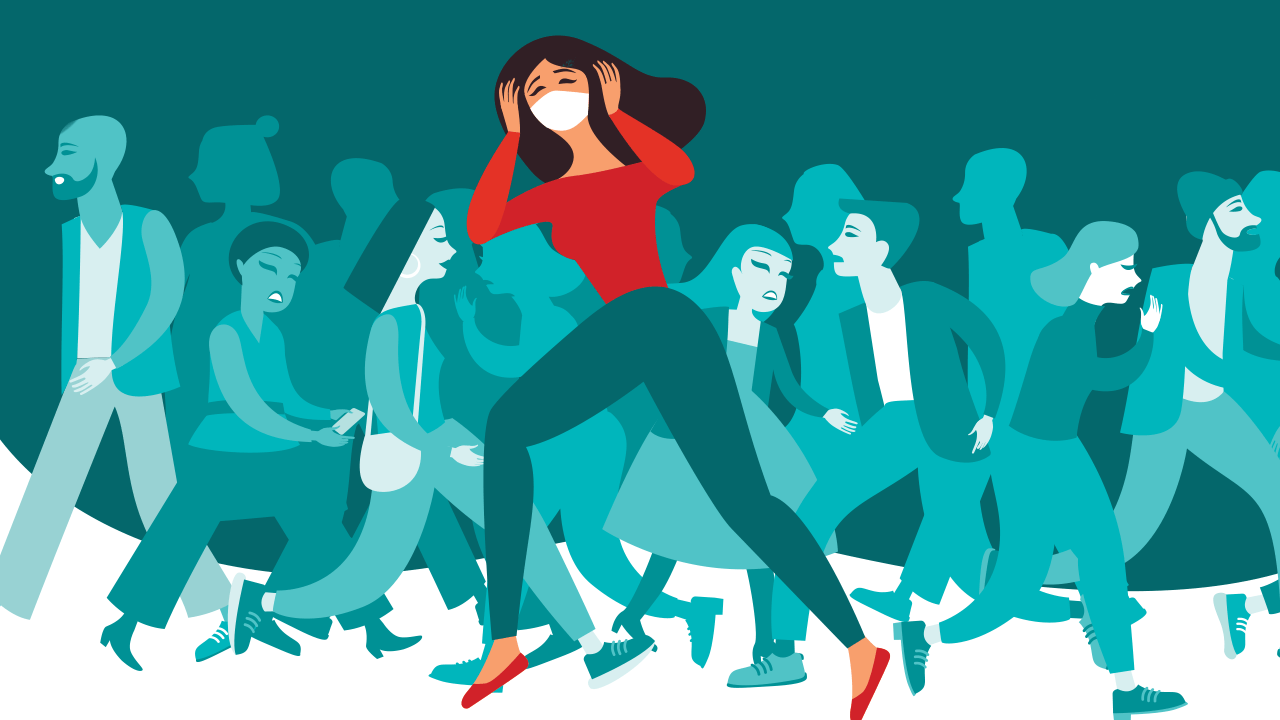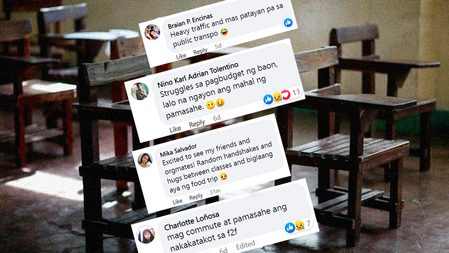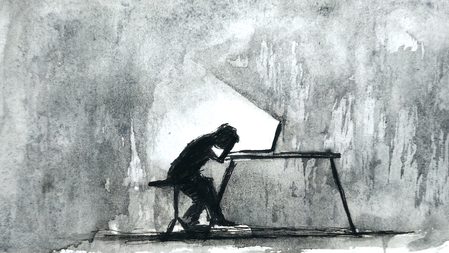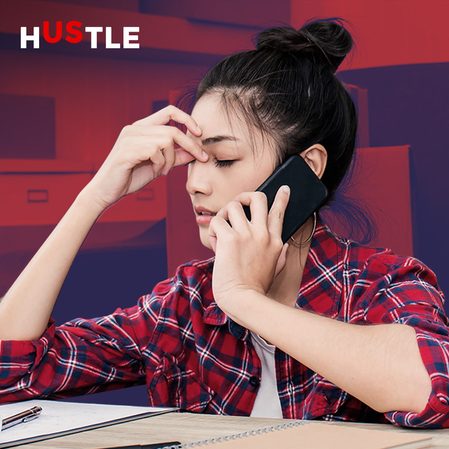SUMMARY
This is AI generated summarization, which may have errors. For context, always refer to the full article.

As more people get vaccinated and restrictions loosen across the country, many are celebrating the joys of the new normal. Family members and friends are getting reunited, while hobbies like traveling and other leisure activities such as going to the cinema or attending concerts have returned.
But given that people had isolated themselves for nearly two years, it’s no surprise that many are also experiencing new or worsening bouts of social anxiety as they return to social situations. Pre-pandemic, we could manage things such as small talk with colleagues, carpooling, or introducing ourselves to strangers on a daily basis without trouble. But now, it has become anxiety-inducing for a lot of us.
With the help of clinical psychologist Abegail Joyce Reguilman from mental health organization Empath, we list down some key tips to make the transition to face-to-face interactions smoother and easier.
What is social anxiety?
Social anxiety is defined by the Diagnostic and Statistical Manual of Mental Disorders as a marked or intense fear of one or more social situations in which the person may be exposed to possible scrutiny by others.
Abegail shared that some people with social anxiety also worry about blushing, trembling, sweating, and stuttering when in social situations, and their usual response is to opt out of situations wherein they have to interact with people. On occasions when they force themselves to interact with other people, they usually experience extreme distress and sometimes even have panic attacks.
How to reintegrate into society
“Some people with social anxiety may have found it relieving to have the perfect excuse to not force themselves to interact with others in-person during the phase in the pandemic when community quarantines and physical distancing were strictly implemented to avoid transmission of the disease,” she said.
Hiding away without having any pressure to attend social gatherings and talk to strangers might have been a welcome opportunity then, but that’s no longer the case for most of us as school and work settings open up. We know that getting out of our usual routines and comfort zones is not an easy feat, so Abegail advised that adjustments have to be gradual, and preparations prior to face-to-face events should be done in advance.
This might sound daunting, but it’s best to not let your anxieties dictate your life. The key to breaking this cycle is to keep on honing your social skills and figuring out where your boundaries are so you can start pushing them a little.
“If you want to overcome your anxiety, there is no better way out than facing your fears. On the other hand, escaping or avoiding feared situations fuels the anxiety even more. You may feel uncomfortable and scared in the process, but sit with your feelings and know that feelings come and go,” she said.
For instance, one can begin preparing for physical interactions by having virtual meetings first. Doing virtual catch-ups or study sessions with friends, classmates, or colleagues can help you establish a connection with the people you’re going to interact with face-to-face and lessen the feeling of anxiety and worry of meeting people you’re not familiar with.
You can also let people you trust know in advance whenever you are going to do something challenging for you. “You can tell them that you would appreciate it if they can send them a message or give a call, in case you find yourself in the middle of an anxiety attack or when feeling awkward around people you are meeting with. Knowing that you can get support from other people when needed may help you feel more confident to get yourself out there,” Abegail explained.
And when the time has come to meet friends and colleagues in person, she said that it’s also helpful to let them know your level of comfort in terms of physical distance, given that there’s also an added layer of health anxiety on top of the social anxiety itself. “You can say something like, ‘Is it okay if we stay one or two meters apart? I am used to talking at more of a distance and I am trying to keep safe.’ If you say things nicely and sincerely, most people are likely to understand and be willing to adjust, and it may surprise you that they prefer the same set-up,” she said, adding that it’s also important to respect the preferences of our peers, in case some of them would prefer to be a little slower in the going-out scene.
“Going out there again should be done at your own pace,” Abegail reminded. “Do not force yourself to be as outgoing as you were pre-pandemic and understand that the pandemic may have had significant effects on your well-being and preferences, and your friends’ as well.”
Abegail also emphasized how all of us are still in a period of transitioning to the new normal, and just like dealing with all kinds of major changes in life, the transition stage is usually filled with challenges and worries.
“Apart from needing to learn how to socialize in person again, people have to re-learn being in traffic, dealing with cramped spaces when using public transportation, dealing with fast-paced foot traffic on the streets for those in the metropolitan areas, getting to work or school on time, and managing family life and schedules. They may be small and mundane things that did not seem to be main contributors to day-to-day stress pre-pandemic, but their effects on how one evaluates his/her day are now heightened because people could compare the experience with doing most activities in the comforts of their home.”
“Some people may hesitate to engage in social activities not because of difficulty relating with others in person, but because they feel overstimulated and exhausted by being exposed to inconveniences that they didn’t have to deal with during the last two years of staying home.”
Prepare for how you’ll react when you get anxious
There are several factors as to why many are feeling anxious during social interactions again, which is why it’s important to go easy on yourself, too. Despite doing your best to prepare yourself, this doesn’t necessarily guarantee you an anxiety-free interaction.
For Abegail, it’s vital that one should also prepare for experiencing a panic attack while in the middle of a social function. “Panic attacks may come without warning, so if you have been battling with anxiety lately or have experienced having panic attacks in the past, it is best to prepare ahead in case a panic attack happens,” she said. Her tips include:
- Make sure that you eat well, limit your caffeine intake, and get enough sleep. Some people get anxious when they do not feel well so having proper nutrition and sleep may lessen the chances of incurring physical illness that may trigger anxiety.
- Install meditation or mindfulness apps, for guided meditation that you can use not only in the event of a panic attack but also for doing a body scan in the morning or any time throughout the day to check and correct tensed muscles and shallow breathing.
- Have a ready “care kit” that you can bring around with you and use for events like anxiety attacks. What’s inside the kit may vary from person to person, depending on what you think will help you stay calm and comfortable during an emergency situation. This may include medication, something to hydrate yourself, some snacks or candies, soothing balm or oils, a book with uplifting quotes or messages, a list of emergency hotlines, a journal, etc.
- Let a trusted person know that you are dealing with anxiety. Ask them to be your support point-person in times of need. Even if they don’t reply right away, the mere knowledge that someone knows the situation when it happens can give some relief to some people.
- Educate yourself on relaxation and grounding techniques and practice doing them so you can have an idea on how to use them when needed.
And if you find yourself caught in a panic attack while in the middle of a social event, you can employ the following steps:
- Excuse yourself and go to a more quiet and less crowded space like a restroom or a parking space. Lessening the physical stimulation from noises and crowds will help calm you down. If you are unable to get out of the room you are in, try to close your eyes and imagine you are in a safe and peaceful place.
- Know that though the uncomfortable and scary feeling may seem like it could last forever, the symptoms usually go away after five to 10 minutes.
- Practice deep breathing by breathing in and out through your nose. You may also exhale through your mouth if that feels more comfortable. Put your palm on your belly and feel the rise and fall of it. Keep doing this until you notice your breathing has slowed down.
- Do grounding exercises to direct your mind’s attention to the present and the physical world around you. There are many techniques to ground yourself and you will need to discover what works best for you. As a rule of thumb, grounding techniques should involve shifting your focus to something you can touch, hear, smell, taste and see. For example, you can think about 5 things you can see, 4 things you can touch, 3 things you can hear, 2 things you can smell and 1 emotion you can feel. Repeat this exercise until you regain a sense of self-control.
- Assure yourself that you have tools at hand, such as your care kit, calming apps, and relaxation techniques that you can use. You can also remind yourself that you have people you can turn into should an emergency happen.
- Once you feel a little better, take note of your experience: what was happening and what you were possibly thinking when the panic attack started, and what helped you overcome the panic attack. You can type this on your phone or write in your journal. You can use this as a reference in determining the possible triggers of the panic attacks and the kind of techniques that work best on you.
Celebrate even the smallest wins
“Anything that you do out of your usual routine can be nerve-wracking, and if you did it for your own good, despite feeling anxious, give yourself a pat on the back,” Abegail said. Rewarding yourself after overcoming a challenging situation can help you gain a different perspective on attending social events, she added.
“Keeping a journal and writing about your experience in terms of going to social events will also help you have an outlet for your worries, hesitations, and other negative feelings associated with it. You may also find yourself gaining a different perspective on your experiences as you re-read your journal entries, say, from the past month, when you are less emotionally attached to the situation,” she said.
When you’ve started getting the hang of it, it’s tempting to agree to most invites to make up for lost time. But it’s best to ease back into social life with a pace and balance that fits with what you’re comfortable doing.
“In between attending social events, give yourself some time alone to decompress and reflect as well. If you have to spend the weekdays at the office, allot the weekend to doing things that you truly enjoy and staying home, depending on your preference,” Abegail shared.
“If you are very busy with other responsibilities and cannot have a full weekend to yourself, allot at least an hour or more, if possible, for some self-care. It is important to communicate to people close to you or to those you have to interact with regularly, such as people you live with, about your intention to decompress and recharge so they can give you that time to yourself and you don’t have to feel guilty about not attending to their needs.”
Know when to ask for professional help
If it turns out that you’re still feeling a lot of anxiety around social situations, it’s probably time to ask for help.
“If despite your efforts to adjust gradually, being able to communicate your fears, and getting support from people you trust about your situation, you are still finding it extremely difficult to be in social situations, you may want to consider getting professional help. This is especially needed when you are already getting panic attacks and/or significant mood shifts during this period of adjustment,” Abegail reminded. – Rappler.com
Abegail Joyce Requilman RPsy is a licensed psychologist who completed her Master of Arts in Psychology degree with specialization in Clinical Psychology. She has years of experience in case management, assessment, counseling and psychotherapy. Throughout her clinical practice, she has worked closely with children, adolescents and adults with intellectual and emotional challenges, as well as clients with mood problems, anxiety, life-transition concerns and substance-abuse disorders. She is passionate about advocating for mental health awareness and has participated in several charitable initiatives that aimed to provide psychological assessment and counseling services to low-income communities. You can book a consultation with her via Empath’s website.
Add a comment
How does this make you feel?



There are no comments yet. Add your comment to start the conversation.